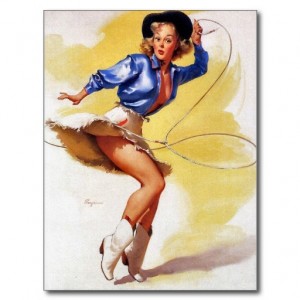
It’s been ten days since I struggled into a car with coat and scarf and bag and laptop and heart and flustered hair and buzzing ears and lots to say and nothing to say and fingertips fizzing from live-tweeting the Australian Theatre Forum 2013.
It’s taken me sometime to digest the forum as a whole: to find out what actually happened at the forum- what worked, what was valuable and to find out what is the value of going to an event like that.
So, to back track somewhat, some months ago when it was announced that the ATF was open for registrations it was revealed that there was limited spaces for independent artists and they needed to apply to attend (as everyone does). There are limited spaces. The forum happens in one place at one time. As one disgruntled tweeter pointed out that the ATF was not following it’s pledge from 2011 which was to ensure that the ATF was webcast live – and it wasn’t. (Not sure if we perhaps were being a little over zealous in 2011 about the state of the NBN…)
The matter of who is at the forum and who is not at the forum has a lot to do with time and resources. I know for a fact that had it not been for Fiona Winning tapping into the rise of the theatre blog in 2011 that the ATF2011 would not have experienced so much online content and discussion. (In 2011 I wrote nearly 14000 words in 3 days and yes I was a mess by the end of it)…. in 2011 I was trying to figure out how to blog about a Forum: I’d not been on assignment before as a blogger: Reviewer, yes. Arts commentator? Yes. But official forum blogger? No. This time around I committed to writing about the forum as much as I felt like it, I had been approached in an official capacity – but my multiple hats can weigh heavy on my head – and I didn’t want to over commit or burnt out…
(**Insert hysterical laughter here**)
So I thought I’d approach the task a little differently – providing a live feed or Tweet stream of key points – for live interaction across the nation and the world – which worked. Worked so well that by midday on the second day I had been locked out of Twitter for using up my tweet allowance in a 24 hour period.
Yep.
Augusta + ATF + Heated/heady discussions about theatre = Broken Twitter
Once I had rejoined the online world again, I had realised that there was a huge (unrealistic and unfair) expectation on Jane Howard and I to provide live and full and current accounts of everything happening at the ATF. Unfortunately I’m not a stenographer and sometimes my thinking about an event or an issue takes time to be properly thought through. So though live tweeting (averaging a tweet ever minute or so) I committed to giving an overview of what lead to my thinking over the course of the ATF. (Check out the online conversation via Twitter #ATF2013)
Because really, let’s face it – no piece of art is engaged with in a void, no conversation is without social context – everything is an accumulation of that which has preceded this moment.
And that is why history is so important.
We forget our past/the past at our peril.
The difficulty was the premise of the Forum was set up as a brokering of conversations – and the conversations I had were largely online or via twitter or about blogging or about arts commentary… what were the other conversations that I had?
Um… I think I was asked my opinion on the food… and about gender politics… and I talked a bit about what’s happening at Casula Powerhouse… and I gave my thoughts on youth theatre… and my opinion on indigenous theatre… and I talked a bit about microbreweries in Canada… and about the dangers of being led astray by Lachlan Philpott on a late night “cultural excursion” in Canberra (AKA King O’Malley’s)…
I may have also seconded a disappointment in the disposable cups and plates being used at the forum.
So I threw a few opinions about.
But I’m not sure there were conversations going on by the end of things: there was a bit of overload, a bit of burn out – in fact there was an instance or two where there wasn’t a conversation, but one-sided expression. There was definitely a moment where the conversation broke down.
And “theatre” couldn’t fix it.
This platform for ideas and conversation and discovery and compassion couldn’t figure it out.
So, I’m not sure that “conversation” did rule the forum.
And what of the constant stream of provocations?
I do love a well-thought out provocation: Malcolm Gladwell, Alain De Botton are at all times at the ready to provoke me into new inspirations.
Did I feel inspired by the provocations.
Personally, no.
The forum itself was a large discussion on Australian politics with a firm focus on funding and strategic directions.
This wasn’t a forum about art, or making or process or inspiring product.
This forum spoke directly to the heart of a very specific style of theatre and provocation.
Some points of discussion missing from the forum included:
1. Playwriting and dramaturgy
2. Globalisation of theatre and what that means to the Australian identity
3. Queer theatre
4. Opera (sustainability of…)
5. philanthropy, crowd sourcing and alternative funding
6. Criticism, blogging and reviews
7. Content being created in the youth and emerging theatre sectors.
I mention the last point as is was only 2 years ago that Kevin Ng (From Shopfront) stood up at the ATF 2011 in Brisbane and asked for a show of hands of those in the room who were under 40, under 35, under 30, under 25… and a small spattering of hands remained – “this is who the future of theatre is.”
And there is no doubt about it – there were missing voices in the room – and though this is the nature of all conferences (and indeed theatre itself is a platform which requires people turning up for things to happen) – I just note it as I missed some voices that could have contributed.
The dilemma with this is huge – the forum itself is exclusionary- theatre is exclusionary by nature, and the more I have thought about this, the more I have felt the disappointed that theatre doesn’t have a wider reach.
Which brings me to the next line of my thoughts: that what bothered me the most was the feeling that emerged online through a few interactions that I was (and Jane Howard too) were privileged in our position as bloggers, and that somehow we had a duty to write about specific aspects of the forum within specific time frames. The truth of the matter is this: blogger, though a part of the theatrical “ecology” (see how I used that word?) are not respected as writers, nor artists, nor contributors generally: and for all the complaints about “funding” – there is not yet to be a stream in the Australia Council funding program which looks after critics or bloggers or arts commentators.
Largely this work is done for free.
And as an independent writer: you are without the safety, security, direction or support of an editor or a team of writers: it’s you fielding the abuse, the name calling, justifying what you have written when you write. And the provocations offered up in blogs (arts criticism or reviews or reflections) are often not engaged with – or when they are they are of an ugly and unproductive aggressive tone.
We’re not good at conversation. Clearly. We’re not practiced in being fair and critical with each other. We are not practiced in listening and sharing in equal measure. And that has been the greatest reveal that this ATF has demonstrated to me.
And it devastated me, for I believe if anyone can create conversation which is inspiring, transformative, elevating, progressive, collaborative… surely, SURELY that would be the theatre makers of Australia?
And of course… whenever I feel like it’s too big, too difficult, too much… I look to another artform to inspire, re-direct and re-set me… Signing off from the ATF with Hunters and Collectors…
]]>
COMING TO A CLOSE: NICOLE BEYER
A few short thank yous from the organiser of the Australian Theatre Forum, Nicole Beyer (Of the Theatre Network Victoria) – including speakers, sponsors, bloggers, caterers… and the HUGE amount of resource that saw hundreds of Australian Theatre practitioners in the same room – and many also online and interacting with blogs and tweets (near and far.)
POSTCARDS FROM THE FUTURE
Presenters: Jason de Santis, Nakkiah Lui, Eva Mullaley, Jason Tamiru, Alexis West, Rachael Maza
A sturdy stream of visions and hopes – ones for a united and loving and collaborative Australian theatre sector.
SUPPER CLUB WRAP UP HOSTED BY NEXT WAVE
Delegates articulate and distil the last three days, and make offers for the future, spurred on by a final set of provocateurs. Each table’s conversations will be transcribed and will form the basis of ATF 2013’s plans, actions and outcomes…
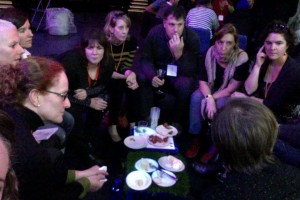
Provocateurs: David Milroy, Colin Kinchela, Lenore Manderson, David Sefton, Elizabeth Walsh
My favourite provocation from David Milroy was:
“Who are our founding mothers and fathers of our creative practice?”
And of course I can not go past the three women I look to:
Katharine Brisbane, Wendy Blacklock and Robyn Archer
And this is what we looked like:
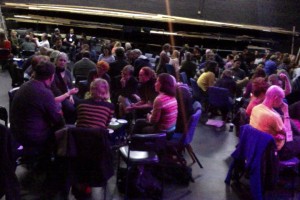
And…
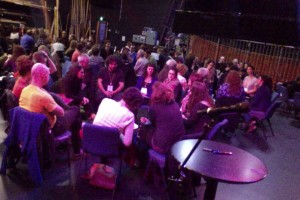
And…
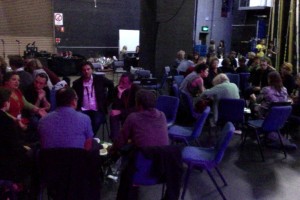
And my final tweet from the car somewhere between Canberra and Sydney reflects a conversation in the car with Ms Howard:
Augusta Supple @AugustaSupple 31 May
GUS: I feel like I left without saying goodbye
JANE: Um you did.
GUS: I’m no good at this.
#goodbye #atf2013
And I guess I’m not good at goodbyes because there is always a sense of “To Be continued” and “I’ll See you soon” and “Until next time” that floats silently on my tongue…
Because there is a sense that I have about this sector, industry, community … whatever you want to call it: I’m dedicated to it – to the long road to the long term… and this is another moment where my thinking got fatter or braver or smaller or something. I’ll tell you when I figure it out.
]]>
And the last day of the ATF and Jane and I were at it again: first up a Keynote from a former-performer now entrepreneurial restauranteur: MissChu… that’s right… this one you can find HERE
KEYNOTE: NAHJI CHU
MissChu, Queen of Rice Paper Rolls, speaks about her own approach to what’s not possible and breaking the rules.
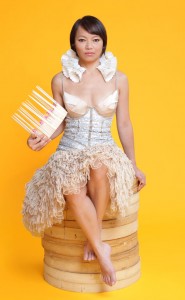
For an overview of the Keynote check out Jane Howard’s blog HERE
This like so many stories about successful people and businesses is about being determined, stubborn and innovative – and by innovative i think it is important for me to make the distinction that I do not mean “novel.” (The key difference being “an innovation and a novelty is that an innovation solves an important, unmet need and a novelty does not.”) Despite having so much prepared, Misschu changed her presentation to suit the room. (The lesson? Adapt. Adapt. Adapt)
And what can a room full of Australia’s theatre practitioners learn from a tuck shop business?
Oh ho! The lessons are major and many:
The personal is everything. The personal is political. The political is also professional.
“As an adult I became a pho seller & I decided I would tell the history of the vietnamese community through food.”
(A refugee who entered the country with nothing has created something. And she is here (in Australia) and her food is in Sydney because of her. The fact that she is here has direct relationship to her political asylum. The story, her life is wrapped up into one
Be your own boss.
(After watching her grandmother (and fighting with her) as a young girl, Misschu saw an easier and better way to run a business – gave up trying to change her grandmother – and did it herself)
Don’t pander to ego.
“You either hate me for invading your suburb or you embrace me”
(It didn’t matter who she was serving – she was just serving as efficiently as possible – when she got a reputation for being curt – she made that a part of her brand – that’s how she is – food comes first – uncompromisingly so. The confidence comes in her product – and like OkRadio had shown us previously, perhaps we worry a little too much about our reputation? Perhaps being unapologetic about standards is everything.)
Invest in what you believe in.
“I’m just not into materialism – I came in with nothing and I’ll leave with nothing – collecting material possessions is not creative.”
(Misschu started her business with $1500 and now turns over $20 million a year)
Businesses that succeed brand for 18-30 year olds.
(Youth audiences and engagement anyone? How often are the 18-30 year olds treated as “youth” not as important participants – the future of audiences rely on young people)
It’s not all up to you to do it all or be it all.
“Delegate! Delegate! Delegate! And trust your staff”
(Knowing what to surrender and what to control: the lesson is to make sure everyone is aware of your standard and of their role in maintaining the standard of the company)
Complacency is the death of relevance.
“I don’t think you can nail anything & I wouldn’t be so complacent to say that you can”
(As demonstrated in her opening address, Misschu chose adaptation to forging ahead with what she prepared. She chose to open with social media engagement – there was no complacence there – that us: sympathetic left wing artists could listen and engage with her first thing on a Friday morning: Context is everything. And complacency will drown you.)
PANEL: FESTIVAL DIRECTORS THE CHANGING NATURE OF AUSTRALIAN FESTIVALS – OR NOT?
Chair: Wesley Enoch; Speakers: Robyn Archer, Jo Duffy, Jonathan Holloway, Edwina Lunn, David Sefton, Noel Staunton
For full details, best refer to Jane Howard’s blog HERE or to check my Twitter stream of search #FestivalDirectors
Interestingly the across country festival landscape was diverse and as compelling festivals themselves: some looking to showcase the bizarre and the unusual, others keen to showcase local talent. In all instances the role of the “festival” as an audience development (not only in numbers but in the development of artistic literacy/engagement) was key.
Curatorial vision was up to the individual festival director’s programming style – and a wide and enthusiastic support of “fringe festivals” as places to develop artists, content and were seen as potential places to source Festival material (not competition for the major festivals). Of course the language of the “artistic eco-system” continued and we were reminded of the importance to be restless in our art-making.
]]>
And so after lunch some more Working Sessions and Presentations, but truth be told I was sort of ready just to snuggle into bed and let all the issues of the Forum gestate: but like so much of the performing arts, a restlessness continues building on top of ideas, and feelings…
But instead, I found my way to the Courtyard theatre to hear some myth-busting from/about the Majors… in fact I was curious to know what the assumed myths were… So I plugged myself in and listened…
WORKING SESSIONS AND PRESENTATIONS – DEBUNKING SOME MYTHS AROUND THE MAJORS
The eight major theatre companies have large staff bases, sizeable programs and myriad ways of creating work and engaging with artists.
From the outside it can be difficult to see how to get in or even to decide working with a major is right for you. This session is designed for people who would like to have a conversation about how the majors work, with some of their General Managers and Executive Directors.
Hosts: Rob Brookman, Sue Donnelly, Brenna Hobson, Jo Porter
Check out #debunkingthemajors via Twitter to see some choice comments.
Most interesting about these myths is that there is a level of funding or support for Majors that the other tiers don’t have access to. And perhaps that is true: the majors do rely heavily on philanthropy, sponsorship and ticket sales to continue their “work of scale.”
I’d like to suggest something by way of comparison: what if each and every independent artist making wok costed out all the “inkind” and “unofficial” sponsorship in their projects: everything from the rental space of working in one’s bedroom, coffee lunches, photocopies made at workplaces on the sly, telephone calls and text messages – what if the in-kind hours of pre-production/production/post production was costed out in line items? What if the “beg borrow steal” aspect of making work by the independent sector was actually included as a line item? What would the scale be around the work?
Interestingly there is a perception that the majors are impenetrable – from the majors point of view that is not so- but as Brookman stated “We’d like to be everything to everyone but we are aware that that is just not possible”
And another impression that the Majors are an unfeeling uncaring machine which doesn’t recognise the plight of the writer. Which again was debunked by Brookman who is married to a playwright and knows the reality of her stage opportunities.
The majors again have a huge task part of which is engaging with business, security audiences, facilitating artists and must be at once outward facing and inwardly focused (and vice versa – fluctuating between the two).
CULTURAL LEADERSHIP IN COMMUNITIES
Group Incognito have been commissioned by the Australia Council to scope and develop a leadership model/program to address the area of
Cultural Leadership in Communities. What is already existing? Are there gaps in skills that help people to use theatre to build stronger communities? What skills do the community need? How can a leadership program be delivered?
Hosts: Group Incognito – Pauline Peel and Lockie McDonald
A small group grew massive after the What is Aboriginal Theatre Workshop was closed off from anyone who doesn’t identify as ATSI. The small foyer swelled and the room was large and noisy. A brief introduction of the room and large sheets of butchers paper – a working bee commenced.
The question posed was: what is the skills gap in the Community and Cultural Development sector and how can a leadership program be developed for CCD practitioners?
Interestingly the room was filled with CCD arts workers who cited a lack of awareness pf cultural protocols, and who may not have the business or project management skills required to manage an “outcome” based project whilst facilitating the community. Many were worried about the “messiah” mentality of the lone worker walking into community in order to work on a project. Coming off the back of the morning session the issues were quite bright in my mind about how difficult language is. It’s true – these types of projects take a LONG time and have long after affects.
(Check out my notes on Twitter #culturalleadership #Communities #ATF2013)
By the time the afternoon workshop had finished….I was fairly worn out.
Here’s a delightful stalker photo of Jane and me taken by Alysha Herrman (You can read her blog HERE)
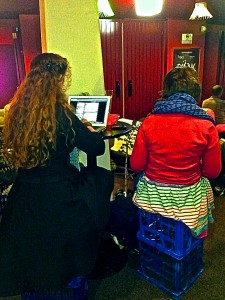
POSTCARDS FROM THE FUTURE
Presenters: Mary Anne Butler, Sopa Enari, Jodee Mundy, Joe Lui Shang Yu
The postcards are always an interesting segment of the ATF – some apocalyptic, some overly optimistic, some very reflective… The idea of a postcard is that it is a short note to the past explaining what the world looks like , how it feels and what is happening – it places the artist at the centre of the vision and creates an opportunity for an individual’s mission statement to be articulated. Mostly it show us what could be: a useful part of the future thinking.
Unfortunately by the time the postcards finished, I was too.
The day had left me feeling empty and here is a picture to prove it:
Gus and Jane Thursday afternoon:
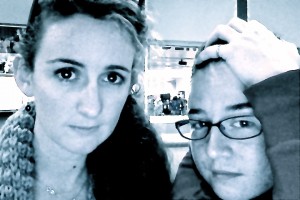

Ah, the Majors! That golden chalice! That pot of gold! The sweet spot on a fresh pillow! The Major performing arts companies the big end of town – big budgets, bit shows, big annual turn over, big audiences.
(Isn’t it fascinating that an artform obsessed with collaboration has so much status obsession and so many hierarchical structures?)
Interestingly for many the Majors indicate the legitimate end of art making and cultural expression in the country. For one I’ve had an interesting relationship with several majors as a freelance independent artist (very publicly so) – In the past I’ve been invited to
PANEL: ARTISTIC DIRECTORS, MAJOR THEATRE COMPANIES VISION AND REINVENTION
Chair: Stephen Armstrong(SA); Speakers: Geordie Brookman (GB), Leticia Caceres (LC), Wesley Enoch (WE), Peter Evans (PE), Mike Finch (MF), Brenna Hobson( BH), Matt Lutton (ML), Polly Rowe (PR)
Jane Howard’s Blog is perfect to reference for this presentation and you can check that out HERE
The Majors discussion at ATF2013 when my Twitter account stopped: it had been a huge morning of interactions… here’s a few of the notes I took around the discussion:
What is the unique offering that each Major company makes to the landscape of Australian Theatre?
WE: Our core business is making theatre – that’s why we get funded that’s why we do what we do.
LC: The unique offering of MTC is story. We are interested in plays. We have a literary manager.
WE: We like white people we want you to come to the QTC… We sees ourselves playing a role in the ecology – work of scale.
PR: We talk about theatre without borders – the idea is not just about bringing in but reaching out and so we have a community department that works with kids in Bankstown, and that a theatre company should offer large scale work but small scale work.
SA: How does that vision impact on the actual practice?
PR: Andrew’s thinking has changed and he had initially thought it was a good idea to get into bed with everyone, so to speak.
SA: Someone’s feet always get cold.
(scattered chuckles from the audience…)
PR: One of the thing Andrew has done has brought in key artists so its more of a house style not just a presenting venue.
SA: Matt Lutton: what about the Malthouse?
ML: I joined Marion when she started. We are in the engine room for ideas. How you can get a group of people in the room before we start talking about ideas. Theatre is made by a team of artists. The thing i find very inspiring is that a project can be initiated by artists from any art form.
SA: How was the transferrance from freelance (Thin Ice in WA) to being in the Malthouse?
ML: At the Malthouse I’ve been encouraged to think big and being liberated and you are humbled to make the most of that – but sometime being a part of a big thing can be quite limiting.
SA asked how ML would change Malthouse. WE stopped that conversation as it was potentially going to undermine Marion Potts.
BH: Ralph came in to create change – he was a set designer – not a director. He wanted to stop hosting independent company and that meant that we had to start producing our own works – that was about employing a whole bunch of artists – about to bring on two associate directors. Ralph’s vision is that he just wanted to make good theatre – it sounds pad but it means that you get rid of any shackles of the notion “my theatre is going to do… ”
PE: At Bell Shakespeare – not just a touring company but a national company – and there are a lot more people doing classics – and so we have to change. I really want to broaden our repetoir. the major change that Chris Toohey would know is that we didn’t have a budget line for royalties – but we are a company that is founded on the back of a writer – and so our Minds Eye program is about partnerships and we are talking to lots more work which is inspired by Shakespeare.
PR: Is there a risk of flattening out if the majors start dipping toes in each others waters?
WE: Goes back to the question what is the unique offering? Our job and purpose is to magnify and reflect and be open to that – what is the unique thing they can offer?
MF: As artistic director: My job is to make the ship doesn’t sink.
WE: An AD is an artist that stamps the aesthetic of the company – how do you do that? It’s not unusual to do 15 hour days…
Liz Jones from LaMama: (From the audience) The plight of the playwright – I just wonder where the playwrights go now? We do facilitate the development of emerging companies… BUT the individual playwright that the pathways have vanished. Can any one in the Majors address that?
ML: Its about continuing the conversation. The doors are open to writers they’ve never been closed: but there are different ways of making. There was a myth for a while that Malty wasn’t interested: but we want to do our over version.
LC: I adore Australian work its the thing she’s most passionate about an we can’t deny it and we are trying to be proactive about it – adn we do have Chris mead who is a champion for diverse voice. There is still a perception that Australian stories wont sell as well as foreign and classics – and I don’t know why – My point is that people love story and especially when its about the here and now right now and all the thing that we cried about an hour ago… I absolutely 100% believe that and I might talk and talk and talk and I am waving the flag 0 give us time.
PR: There is a perception is that New Work is hard and it is harder – and I think there is an unreasonable expectation on new plays – and we compare wot August Osage County or Chekov and it is going to be different. I think we could make more incentives for directors on
Directors should have a small royalty on directing new plays.
LC: I disagree – a credit as the dramaturg in the room perhaps but the royalties issue is what makes tours come unstuck.
BH: Belvoir has made a commitment for only new Australian works – and working with a company called post who don’t call themselves writers but is just as important. Directors need to have multiple opportunities and to be brave enough to fail and having the space to fail.
WE: Can I be controversial: I think SA is based on evidence based decision making: what will the costs be: what role do collectives and artists have in their own audience development… you are not to arrive with your training wheels on…
Question from the audience: How many of the State companies attend alternative spaces to find work? Eg art galleries? I’d rather go to those alternative spaces.
Tim Jones from Seymour Centre (From the audience) : Are you do anything for mid to late career artists if we all want to be like John Bell and work late into your career – do you do anything for those artists?
PE: I agree. There was nothing for emerging – and now it is fantastic – but there are now some Gen-Xers in the black hole.
WE: We need to know that we are in an industry of natural attrition – there is skill, there is talent, there is chance – and sometimes we are not in charge of that. It’s more than that – isn’t that the goal of every artist to have a career that lasts until death. And how do we regard our senior artists?
****
So… that’s a bit of a taste of the conversation that happened with the majors…
My reflections are really about ecology and the biological terminology which is offered up: perhaps the idea that there is a natural attrition to the lifespan of artists careers is an interesting one: is this survival of the fittest?
In the realm of ecology there are many forms of symbiosis (mutualistic, commensalistic, or parasitic) – and the simplicity of understanding art through a scientific lens indicates that there is some sort of control or ideal that can be measured and weighed. I don’t at all disagree with the fact that the Major companies rely on the small- medium sector, and perhaps one of the most important messages to come out of this discussion was an acknowledgement that all (or nearly all) sitting on the panel had at some time been freelancing.
So often it feels that the independent sector (and I am relating to Sydney in this instance) has a large interest in creating work that “auditions” for the main stages. What is really unfortunate about this audition mentality is that there is an idea that once you’ve been inside a major, you’ve “made it.”
You’ve been legitimized or recognised as a talent.
Also there is a misconception that paid work is more validating than unpaid work.
It’s my firm and sturdy belief that the riskier and most interesting and vibrant work happens in the independent sector – and that sector is fueled by inspiration which isn’t and can’t be subscriber dictated, money oriented. The independent sector has to generate work that is compelling and inspiring enough for people to want to invest their time… and so therefore, for me I look at the strength of the independent sector as a litmus test of our artscene.
I also don’t think that mainstage or independent or quirky gallery space or site specific work are really in competition with each other. Nor do I think that the mission statement of any company should be to do anything other than “to make really great theatre…” as Brenna suggested.
Much of the development of artists doesn’t in my view happen in the soft shelter of the Majors – nor does the support they offer last forever. What is important about the majors is that they offer scale and the safety of resources. They also offer aspirational exposure (whereas some Indie spaces accommodate 43 people – main stages offer ten or twenty times that)… in offering that level of exposure – the stakes are raised for the artist – because everyone is a critic and when you are exposed to that many minds/hearts – ideas are inevitably questioned.
Is there a natural attrition? Perhaps?
Do we facilitate our senior artists. No.
And it is to our shame and detriment.
Furthermore in the biological overview of the artistic field – we perhaps need to talk about what makes a strong eco-system. And a strong eco system is one which is highly diverse. There is no denying that the previous session was a wake up call about the diversity in Australian theatre. I ask again – where are our mulit-language playwrights? How many of us have not been churned out of a Drama School with the expectation of templated approaches and behaviours towards art and when making or regarding art?
Is our industry diverse?
The role of the artist is to keep evolving and growing and adapting and that is the most important element in understanding the ecology of theatre.
]]>
FORUM ADDRESS: TONY GRYBOWSKI THE AUSTRALIA COUNCIL FOR THE ARTS
Hear from the newly appointed CEO, Tony Grybowski.
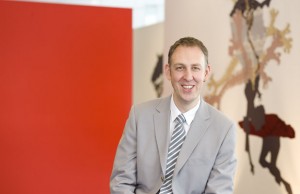
A little bit of a shake up. It’s true. In recent months the Federal Government (in relation to the arts) has been shaken like a snow globe… papers fly like flecks of snow and we watch in wonder. Or perhaps it’s more like the lotto – watching the swirl of numbers seeing them slowly slip into slots. A National Cultural Policy is announced (the first in 17 years) check it out HERE , Minister Simon Crean is reshuffled out of the deck and the very charming and arts-aligned Minister Tony Burke steps up and into the job and introduces himself to the Arts and Cultural sector immediately (yes I was there – being charmed by his enthusiasm – but you can read more about that HERE) – and the Australia Council has a staff reshuffle…
And not surprisingly the arts sector waits with baited breath to find out the fate of funding priorities… and to meet the new CEO Tony Grybowski. You can read more about him HERE
Tony Grybowski has taken a leaf out of Tony Burke’s book and met the introduction to a room full of hungry (not necessarily starving) artists with courage… introducing himself and declaring his Tuba tendencies and even confessing to be a regular theatre goer. It was a fairly un-ruffling address – sturdy and open that things are not yet decided (with a September election looming – that’s hardly surprising) but a few facts are certain: a peer assessment panel will be developed in response to the nature of the grant applications received, that policy areas of the Australia Council will be separated out from peer assessment aspects, that there will be more research into unfunded excellence, that the government will maintain an arms-length approach to OZCO and that the strategic priorities are yet to be determined.
Of course it is the toughest of gigs, addressing a room full of Australia’s most prestigious, prolific and and progressive theatre makers. Especially before 10am. And perhaps before coffee. Especially when there isn’t a huge amount to say except sticking to a cake-taker line: “there are going to be changes and redefinitions but we are yet to determine what those will be…” (I’m paraphrasing.)
Thrown open to the floor and a rather confident question about the configuration of the peer assessment panel asked: will the panel be free from political stacking and the response fairly clear: that the peer assessment panel will comprise of artists – and this is going to be tough because with all the caveats on that (ie being paid $257 a meeting, reading dozens of applications and not being able to apply for funding) many artists don’t want to be an assessor.
Then there was a question from a different part of the floor that asked about the abolition of the ATSI certificate require by Australia Council to prove indigenous status. Grybowski stated that that was a topic of discussion at a recent ATSI board meeting. The querent responded with a statement that made that point that the act of asking for proof is a great source of pain and emotional distress.
On that note, Tony Grybowski’s welcoming/introductory address ended.
At the time I tweeted: (By the way – that ended with a really weird feeling in the room) #ATF2013
KEYNOTE: KELLY COPPER AND PAVOL LISKA NATURE THEATER OF OKLAHOMA AND OK RADIO
Pavol and Kelly discuss the work of their company and the creation of OK Radio
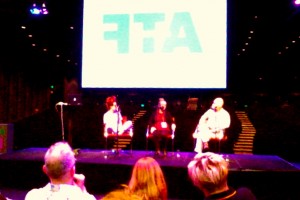
If you look on the website which is HERE there is a statement by Pavol Liska:
“People are so much more interesting than the art that we give them.” – Pavol Liska
That is sometimes true.
And if it is, or it’s not true (absolutely or momentarily, specifically or generally) – it’s a great conversation starter.
And that’s what OK Radio is about. Created by Oklahoma Theater Company these are long form conversations with artists around the world about what they do.
This session was no different.
Except perhaps the fact they were wearing pyjamas.
It’s an interesting technique the pyjama technique of presentation: there is something cozy and cute about a man in monkey pyjamas. But really – this session wasn’t about being cute. These were pyjama provocateurs.
And this wasn’t a keynote speech of WHAT they do – this was a demonstration of HOW they do it.
And in a conference which was couched in the theme of “conversation” this seemed like a perfectly natural presentation. Which seemed doubly natural as it was being hosted by The Nature Theatre of Oklahoma which you can find more about HERE
A brief provocative spiel about proving one’s dedication to the artform of theatre by raising and keeping one hand up – an act of fatiguing solidarity a perfect physical gesture toward the physical demands of theatre as an artform – but also a perfect booby-trap for a volunteer to be included up on stage and in a conversation.
Interestingly Claudia Chidiac (a colleague of mine) and an artist known for her commitment to community works, community projects and a focus on political and social theatre was brought onto stage.
So the line of questioning is therefore fairly obvious.
PAVOL: “What is the biggest obstacles in the creation of Australian theatre?”
PAVOL: “Would you divide the money into a lot of little grants or give one big pot of money?”
PAVOL: “I worry that we spend more time worrying about money than making work.”
PAVOL: “Theatre people are all very nice people… And I wonder if that is our problem that we are too polite… We choose an art form where we can sit next to each other and touch each other and we’re very good people.”
PAVOL:”Do you think theatre is an effective mechanism for social change?”
PAVOL: “Would you risk not being liked in order for revolution to occur?”
PAVOL: “Do you have an example of theatre creating social change?”
PAVOL: “Do you have a mass audience?”
PAVOL: “Do you think being a nice person stands in our way when we are making theatre?”
PAVOL: “Do you think we should behave more like gangs?”
KELLY: “Pavol lived through the Velvet Revolution and they stopped making art to make that revolution happen.”
PAVOL: “If the political nature of work has lost intensity, that seems ineffective. Forgive me, but that seems weak.”
KELLY: For us the problems are not interesting in theatre: money, interpersonal problems between people.
PAVOL: The mission is how do we get the best out of the artform – and here we are all ready to touch each other – but we are weak. It is sad to see ourselves not make the most of our artform.
PAVOL: Do we have an imagination to make change? No offense to Alicia – but all we can we imagine is to change the seating in the theatre… (he gestures to the fact we are seated onstage in an auditorium full of seats) Do we have an imagination?
And then the floor was thrown open.
A comment was made that perhaps the ineffectual nature of theatre in Australia was the fact that there wasn’t a threat of artists being gaoled or murdered for their art.
And at this moment, the Keynote was no longer about what was on stage, but the discussion on the floor.
A huge conversation errupted which I don’t care to notate (I stopped Tweeting then and I don’t need to start now) only to say that known activist/warrior/hiphop artist/writer Candy Bowers gave a passionate oration forward about the “unacknowledged Aparthied” in Australia that blew everyone away due to its sheer force of reckoning: “Our biggest problem is that we have indigenous 10 year old boys killing themselves & we’re putting on My Fair Lady?”
A flailing defense. Some sputtering sentences.
Sentences snipered before they could begin.
Wesley Enoch walked out of the room.
The room was silenced.
Pavol acknowledged he was intimated “in a good way” by Bowers.
And everything she said is undeniable. And we all know that.
The country in which we live and make work has a history which is filled with huge pain and shame and horror. A history of invasion. Of human rights atrocity. Of neglect and abuse. A history which continues of not facing up to that which is difficult, that which is ugly. That which is true. It is true that the suffering of indigenous people is not a thing of the past – but of our living history. It is true that there is a HUGE gap in the life expectancy for indigenous people as opposed to non-indigenous people. We live in a country where language, cultural practice has been denied and lost and cut out of memory. We live in a country which has not faced it’s past on a practical, social, day-to-day reality.
There is no defense for our history. There is nothing more that can be said.
At that moment, when Wesley Enoch left the room –
There can be only silence – because the fact that there are social justice, equity problems existing in this country means that Pavol is right: theatre is not the greatest mechanism for social change.
And socially, as people, (not just as artists) we have failed.
Then, Lee Lewis, Microphone in hand acknowledged that Wesley Enoch had left the room and that this was a time to make a decision about who we were going to follow.
People started leaving.
I stood up, gather my things and left.
It was quiet as I walked across the stage. I heard my heels. Nothing else. I pushed my way out of the doors of the theatre. I quietly hugged who I needed to. Sat on a milkcrate and continued to Tweet.
So.
There I was. A person who for years has believed in the power of conversation and discussion, opting not to continue with that discussion- but to continue my own line of personal questioning on Twitter:
Do I stay and listen and try to understand this conversation – or do I leave to indicate my values?
So is it chicken or brave to leave a conversation?
If you stay in a room because you are paralysed or too uncomfortable or scared to leave – how can you make great epic art?
We talk about wanting dangerous and political art for social change – but can we hack it?
And what if all the theatre we made triggered that type of reaction? That “I feel sick” “I need to de-brief” reaction.
How can we claim to want to make art that changes the world when we’re not practiced/equipped to handle a social crisis in a room?
And look at us.
A community who believes in art.
Believes in the necessity of conflict (which all drama is based on).
A group of people who are all about creating safe spaces for dangerous ideas.
Individuals who may claim that we are willing to not be liked for revolution (social change) to occur.
People who at the opening of the session were identified as some of the nicest, most polite, gregarious people – now fractured. Now sitting apart.
A group who live their lives believing in communication and confrontation.
Artists who want to trigger powerful responses in an audience – and yet we experienced a full breakdown of communication.
Surely if any group of people were prepared to tackle the tough stuff, to have a conversation on a higher or deeper level surely SURELY that should have been us?
We spend our lives talking and finding compassion for difficult characters or tough situations: and surely we would have been practiced and prepared for that style of thinking, or conflict?
Has story taught us nothing about how to regard each other?
Has our practice not prepared us?
No. It didn’t.
BUT (and here’s the clincher)…. the genius of all of this was that we proved OK Radio’s line of questioning wrong.
Look what happened: a situation full of conflict asked for action.
This was us DEMONSTRATING to OK Radio (and to ourselves) the power of words, of action: the rudiments of theatre.
There we were SHOWING our conflict: possibly for the first time to that intensity, to that level of discomfort. We were showing that all acts are politicized. That words carry weight and ARE affective. (and anyone who has been audience to Candy Bowers knows that deep, deep in their bones and soul and gut and heart.)
How often are we asked to reveal the unrevealable – to be courageous in art – to be unashamed in being ugly – to be provocative – to be risky in what we say/do/show? How often are we trying to push the barriers? Or push ourselves?
And we were pushed.
Pushed into a defense of theatre.
Pushed into revealing our politics, and thus our fractured perspectives.
Pushed into confronting facts.
Pushed into confronting history.
Pushed into making a choice about what had to happen next: stay, talk or walk.
Now pushed into a moment for and of and about social change?
Some in tears. Some indifferent. Some angry. Some alone. Some hugged together.
And there I was. Trembling.
And then there was morning tea….
(For more on this session please check out Jane Howard’s post HERE )
]]>
Australian Theatre Forum | Canberra Theatre Centre | Wednesday 27th May
The Australian Theatre Forum is THE theatre foyer of all theatre foyers. A huge milling massing mob, a swirling swilling symphony of conversations, bright bubbling people talking on telephones, kissing cheeks and giving knowing nods. In this foyer independent artists stand alongside Aritistic Directors, Festival programmers, performance artists, live artists and playwrights stand with Education officers, Directors, bloggers and venue managers – its a cacophany of charisma this foyer.
And not for the faint-hearted.
The forum’s curator Alicia Talbot is well-known in the theatre community (Yes I use the word “community” – a nod in the direction of Alison Croggon who takes exception at theatre being referred to as an “industry”… in days gone by I have grizzled at the word “sector” and so the best fit in my opinion for this wide-reaching, morphing, evolving, restless, multi-platform hydra-headed artform is “community”) through her work as Artistic Director of Urban Theatre Projects. Her bio speaks to the tone and the style of the forum’s program:
“Alicia Talbot is a Sydney based independent director and curator working in contemporary theatre and performance. Alicia has developed a practice of creating signature style works that have predominantly been site based and have tackled difficult emotional, social and artistic terrain.”
First up:
WELCOME TO COUNTRY AND THE CENTENARY OF CANBERRA: AGNES O’SHEA, ROBYN ARCHER
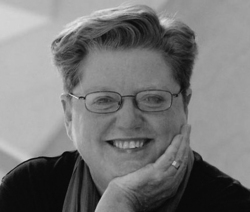
“Robyn Archer AO is a singer, writer, artistic director and public advocate of the arts. She is currently Creative Director of the Centenary of Canberra (2013), Artistic Director of The Light in Winter, (which she created for Federation Square, Melbourne). Her selected speeches are published under the title Detritus (UWA Press). She is patron of numerous arts organisations and has received many prestigious arts awards. She is an Officer of the Order of Australia, Chevalier de l’Ordre des Arts et des Lettres (France), Officer of the Crown (Belgium) and holds honorary doctorates from Flinders University (SA), and the Universities of Sydney and Canberra.”
Two elders: One of country and the other of our theatre community address us. Agnes welcoming us to her people’s land and explaining the common courtesy of the welcome, which identifies us as visitors to place – for the safety and wellbeing (physical and spirital) of us all. To say it this welcome ended with “you can leave your footprints here.” And I felt welcomed and honoured to be in Canberra and at the ATF.
And then Robyn Archer addressed us: she is the robust voiced champion of festivals and cabaret and innovative thinking (Yes I recently opened an exhibition on Subcultures at Casula Powerhouse Arts Centre called “Pigeon Auction” which I referenced her Platform paper “The Myth of the Mainstream” – her thinking and voice is nothing short of inspiring) – and her welcome to Canberra was a welcome to cut through assumption.
So, perhaps I should back up a bit and contextualise this a little – because, after all theatre, in and of itself, deals with three major concerns: time, place and audience.
TIME/PLACE/AUDIENCE: In September 2011 the Australian theatre Forum was at the Powerhouse in Brisbane. I was 31. I was a freelancing writer and director – and was asked to be the official blogger representing NSW. Now it is May 2013, I’m 33 and I am the assistant director of the Casula Powerhouse Arts Centre. (See how my sense of time is linked with work? Yes I’ve noted that – boring isn’t it?) In 2011 I was blogging very regularly (I’d taken a year off from practice to mend a broken heart – and no that didn’t really happen) in 2013 I blog infrequently after an anonymous death threat and a series of real-life trolls stopped me in my tracks.
But back to the ATF: Canberra in the middle of its centenary – splashes the slogan “Getting to know your capital again.” And that sentence in itself speaks of a disconnect. Interestingly Robyn Archer appeals to us now as she did then to re-view our perception of Canberra and see it as a significant repository of some of Australia’s cultural identifiers- Australian War Memorial, National Arboretum, National Film and Sound Archives, National Library of Australia, National Portrait Gallery http://canberra100.com.au/about/ and if anyone can sell the idea of arts and culture and National significance, its Robyn Archer. And she does. Beautifully. And of course she sang to us: it is my firm belief every morning should start with Robyn Archer singing to us: its a fortifying thing.
BUT what’s tricky about this idea about the “nation’s capital” and the respository of Australian cultural identifiers is our history.
Our current history. Our recent history.
It is no secret that the current Australian theatre “industry” is one which is fraught with identity crisis – because for the simple fact we have not come to terms with colonisation and genocide. We are not proud of our politicians and leaders. We are, I believe a nation which is ashamed and trying to constantly ignore our behaviours, our mistakes and the fractures that exist between peoples in our country.
The invitation from Robyn to re-discover and to have a new and fresh view of Canberra – is a call for healing and to be in the hear and now to stop and examine who we are, now in an historical context.
And it’s a great invitation.
Canberra is a testament to creativity – a city invented and designed and planned. At least at the start, but as things, people, places often do: they change with the needs of people… Some cities have had a couple of hundred years to develop their unique flavour, Canberra has has 100…
And there we are – from all around Australia converging on the nations captital. Creative people in a creative space.
And it is thrilling just to be in the same room after only existing online or in rumour – or on the occasional tour or festival. But not all of us are here: some of us are in rehearsal, at desks, working other jobs, on stages, presenting works… and I am mindful of that and what that means to not have a mass of independent artists, critics/arts commentators (or even actors) in the room – but we do, as we must, adapt and find alternative ways to communicate.
OPENING KEYNOTE: LENORE MANDERSON AND KRISTIN ALFORD | REHEARSING THE FUTURE – ANTI-FRAGILITY AND RISK AVERSION
“Contributing scientists to the Australian Academy of Science’s Australia 2050 report, Lenore and Krstin begin their discussion with the question: “Do we even have a future?””

“Kristin Alford is the founding director of Bridge8, helping organisations and individuals to discover new utilising foresight and strategy frameworks. Prior to establishing Bridge8, Kristin developed a broad career in engineering, human resources and product development across sectors including mining, R&D, aviation, agriculture and nanotechnology. Kristin holds a PhD in process engineering and a Masters of Management in Strategic Foresight. She is a graduate of the Australian Institute of Company Directors and a Fellow of the Governor’s Leadership Foundation. She was recently a member of the Australian Government’s Expert Forum on Enabling Technologies and served on the board of the Australian Network for Art and Technology from 2007-2012. She is the licensee and organiser of TEDxAdelaide.”

Lenore Manderson is internationally renowned as a medical anthropologist, social historian and public health researcher and educator. She has played a lead role in training in Australia, Asia and Africa, and has conducted research extensively in inequality, social exclusion and marginality, gender and sexuality in Australia and internationally. Her most recent book is Surface Tensions.
Read more here: lenoremanderson.com/about
In a curatorial stroke -Alicia Talbot’s program is all about provocations and this tone-setter was of huge tone setting.
Two highly intelligent, powerful speakers primed to have a conversation around the topic of “risk.”
And it was risky to have two speakers in conversation –
And here are some key points I publicly noted on Twitter:
PROVOCATION FROM LENORE: “If Theatre is the rehearsal of possibilities – how does that change or inspire what you are doing?”
KRISTIN: When asked what the future looks like – say in 2035 most people’s responses are fairly ordinary in their imaginings.
LENORE: Future thinking: the sci-fi dystopia is probably a dystopia because we have no future thinking – we are just reacting to the now.
LENORE: What does risk mean when we are all so completely bound by our self/ contexts (bodies, voices, skin-coloured microphones included)
LENORE: There is no future thinking in the pattern of grant writing
And they are right: It’s true “risk adverse” systems rule the world & that’s ok with me. Artists need these risk adverse systems to help us define what risk is. I sometimes think being polite is risky behaviour because you risk nipping in the bud an unwieldy and ugly consequence. I also see compassion as “punk” or alternative… especially when caring is considered creepy. I think risk is personal – we all have different limits and different things we are risking: the most boring of all discussion around “risks” to me is the “risk of money.” The most stressful and interesting of risk is “risk of identity” and “risk of reputation.” (And Jane Howard, James Waites and countless other bloggers and critics and reviewers I keep company with know all too well the points at which you risk reputation)
KEYNOTE: DAVID MILROY
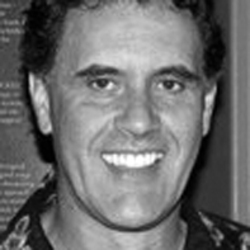
“David Milroy was the first Artistic Director of Yirra Yaakin Aboriginal Theatre and in 2002 received a Myer Award for his contribution to the development of Indigenous theatre. David was a guest Director of the American Playwrights Conference in 2002 and has attended the Australian National Playwrights Conference on a number of occasions as a writer and Director. David received the 2004 Patrick White Award and the 2005 Equity Guild Award for his play Windmill Baby and a Deadly Award for his music in Windmill Baby. David was also a finalist in the Helpmann Awards and received two Equity Guild Awards in 2011 or his play Waltzing the Wilarra. David is currently writing his new play Crowbones and Carnivores and is chairperson of the Palyku Native Title Working Party in the East Pilbara.”
As a first point of call I refer you to Jane Howard’s excellent long-form blog
From the very moment he welcomed us: Milroy was ready to subvert the usual and expected: “Please remember to turn your mobile phones on when you leave the room…”
The bulk of the address was about collaborations with indigenous artists – about the significance and importance of the ownership and agency within telling aboriginal stories, aboriginal representation in stories.
Some key comments from David Milroy:
I’ve had been approached by many who sent me plays which include the sentence I’ve written this aboriginal story: To their credit they took rejection well.
If aboriginal people were 97.5% of the population would be be telling the others’ stories?
It’s not good enough to get the protocol document from the Australia Council and tick the boxes.
We have been a very studied prodded race of people
How do you know the significance & the meaning of the things for aboriginal people unless you ask?
Culture runs deep in this country… be mindful of this when you write about the colonial past.
Humility and respect are essential in the collaboration with indigenous people
There is no such thing as a generic Aboriginal person, we all come from somewhere
If you really want to empower aboriginal artists – work with them on their terms
When people want to put an aboriginal character in – they do it in a generic way: they’re not tied to country. It’s creepy.
It’s important that we have an authentic voice. It’s about facing yourself and being honest about it.
The tweet stream was alive with excitement at his address:
Lyn Wallis @DirectorTheatre 29 May
Fantastic keynote from David Milroy and very lively post-discussion. Indigenous artists must tell their own stories. #ATF2013
Bryce Ives @bryceives 29 May
Isn’t it awesome to sit in a multilayered discussion – there would be few conferences where you’d hear this level of discussion #ATF2013
Simon Hinton @theatrehinton 29 May
David Milroy’s wonderful, warm provocation teaches us the power of humour and generosity when communicating about difficult things #ATF2013
Aaron Beach @MrAaronBeach 29 May
@DavidWilliamsv2 @tahnif @brennahobson this is the best discussion I’ve been part of for a long time #historic #important #atf2013
And the feeling in the room was of pure possibility – a REAL conversation about meaningful engagement and collaboration – it was the most exciting conversation that could be had.
]]>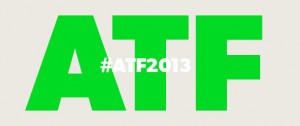
The Australian Theatre Forum is possibly one of the most significant events on a theatre person’s calender. It is the almighty convergence of venues, companies, organisations, bureaucrats, artists, touring companies. It may appear to be a little strange that an industry which is largely foyer-dwelling and highly present in social media AND practiced in conversation needs such an event.
But it does.
The ATF is a time of concentrated conversation as outlined by Curator Alicia Talbot:
“As a leap of faith we have had an amazing response from
artists, producers and presenters across the country.
I began the curation of ATF 2013 with a simple frame of
wanting to talk about ‘what’s not possible?’ as a way of
stretching our minds and thoughts forward over the next
30 years and to think about the broader questions that
we grapple with as makers, artists and cultural producers.
Alongside this, I gave myself the provocation of ‘not
knowing’ to embrace curiosity and freedom, and open my
mind to ideas and questions outside my frame of reference.
I would describe this as a willful and measured naivety.
There are always critical issues we are compelled to talk
about – but what else can happen if we knowingly put
these to one side?
In assembling the program I have been directly inspired by
attending IETM – International Network for Contemporary
Performing Arts – over the last three years. Not because
it is European, but because I am interested in the people
and the conversations – accidental and intended, formal
and informal. Away from the environment of a market-
focused meeting, how can we diffuse an artificial hierarchy
to engage in conversations that thread diverse practices,
ideas and provocations to re-inspire ourselves, and one
another…Talk to people we don’t know, follow the scent of
a good idea, do some business and pursue an interesting
conversation not knowing where it will lead…
This, and discussions across the country, has lead to the
program for ATF 2013.
I look forward to listening, to being in it, and to having
these conversations.”
It’s true such a huge coming together of such a mass of people privileges big conversations – strategic thinking – it celebrates the examination of past and encourages future thinking. Whereas some conferences and meetings and foyers are reserved for venues or presenters – the ATF is a convergence of many voices and perspectives. Not surprisingly the question has been asked about WHO is in this conversation, and WHO has been asked to speak.
It’s been suggested by 5thWall that perhaps the forum should be webcast – allowing greater access to emerging and remote companies and artists – especially in light of the commitment to embrace technology that was presented at the ATF in 2011.
It is indeed unfortunate, but true that Theatre Forums, like theatre itself, deal in the immediate and the finite and the transient.
It’s intense.
We’re talking about a perpetually “in crisis” industry. We’re uncovering issues around identity, process, sustainability, cultural well-being. And it’s national.
On Tuesday night there was a convergence of the Marketing Summit, APACA conference, Tipping Point and Australian Theatre at a networking drinks.
Moments felt like I was walking into my CV – and other moments felt like I was walking into a thinly veiled war of agendas – we know we have a finite amount of time – and so much to talk about and the tension becomes about having meaningful, broad and deep engagement with people…. and with a room full of fascinating and accomplished thinkers, artists, potential partners and collaborators, the task at hand : ie “a conversation” can feel like the most impossible thing to achieve – especially if you have “a fear of missing out.”
SO MANY PEOPLE TO TALK TO!!! HOW DO I GET THE MOST OUT OF THIS CONVERSATION?
Sometimes all that is necessary is to be there.
It’s a funny thing – that despite the rhetoric of being “curious” and “open” and “experimental” and “risky” and “brave” and “generous” in our artmaking – that we forget to be that with each other. And yes, I’m not oblivious to the sometimes thoughtless, sometimes careless, sometimes obliviousness of behaviour under pressure.
In the last year my industry self-identity has gone through many evolutions – Blogger – Indie Director – Critic – Provocateur – Philanthropist – Cheerleader – Script Developer – Arts Centre Administrator -Board Member – Start Up Advisor: and It has been a time of great reflection. So I come to this forum with many identities – many interests – and a long memory of the work of many of the people in the room.
However, I think it’s important to honour the past but not be limited by it: including the assumptions we make about ourselves and each other.
This Forum I hope to curious, open, experimental, risky, brave and generous in my conversations and in my tweets. I hope to enter into a dialogue with a variety of people – a dialogue which is respectful and responsive.
]]>